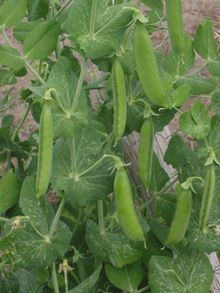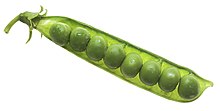pea
English


Pronunciation
Etymology 1
Back-formation from pease, originally an uncountable noun meaning "peas" that was construed as a plural, ultimately from Ancient Greek πίσον (píson).
Noun
pea (plural peas)
- (botany) A plant, Pisum sativum, member of the legume (Fabaceae) family.
- (cooking) The edible seed of some of these plants.
- (baseball) A ball travelling at high velocity.
Usage notes
See usage notes at bean regarding the differences in terminology.
Derived terms
Descendants
- Lua error in Module:etymology/templates/descendant at line 287: You specified a term in 4= and not one in 3=. You probably meant to use t= to specify a gloss instead. If you intended to specify two terms, put the second term in 3=.
- Lua error in Module:etymology/templates/descendant at line 287: You specified a term in 4= and not one in 3=. You probably meant to use t= to specify a gloss instead. If you intended to specify two terms, put the second term in 3=.
- → Yurok: pi·š, peeesh (“a pea”)
Translations
|
|
|
Etymology 2
From Middle English pe, po, poue, pa, paue, from Old English pēa, pāwa (“peacock”) (compare Old English pāwe (“peahen”)) and Old Norse pái (“peacock”), both from Proto-Germanic *pāwô (“peacock”), from Latin pāvō (“peacock”). Cognate with Saterland Frisian Pau, West Frisian pau, Dutch pauw, German Pfau.
Noun
pea (plural peas)
Derived terms
Etymology 3
Noun
pea (plural peas)
Further reading
Anagrams
Estonian
Etymology
From Lua error in Module:parameters at line 290: Parameter 2 should be a valid language or etymology language code; the value "fiu-fin-pro" is not valid. See WT:LOL and WT:LOL/E., from Proto-Uralic *päŋe. Cognate with Finnish pää and Hungarian fej.
Noun
pea (genitive pea, partitive pead)
Declension
| singular (ainsus) | plural (mitmus) | |
|---|---|---|
| nominative (nimetav) | pea | pead |
| genitive (omastav) | pea | peade |
| partitive (osastav) | pead | päid |
| illative (sisseütlev) | peasse | peadesse |
| inessive (seesütlev) | peas | peades |
| elative (seestütlev) | peast | peadest |
| allative (alaleütlev) | peale | peadele |
| adessive (alalütlev) | peal | peadel |
| ablative (alaltütlev) | pealt | peadelt |
| translative (saav) | peaks | peadeks |
| terminative (rajav) | peani | peadeni |
| essive (olev) | peana | peadena |
| abessive (ilmaütlev) | peata | peadeta |
| comitative (kaasaütlev) | peaga | peadega |
Adverb
pea
- almost
- Pea iga kord seisab ta seal kohas.
- He stands there almost every time.
- soon, immediately, quickly (in modern use almost always together with some other word or affix, such as kohe, õige, nii, -gi)
- Kohe pea oleme kohal.
- Soon we'll be there.
- Rändurid uinusid pea.
- The travelers fell asleep quickly.
Japanese
Romanization
pea
Maori
Etymology
Noun
pea
Spanish
Pronunciation
Etymology 1
From peer.
Noun
pea f (plural peas)
Synonyms
- See Thesaurus:borrachera.
Etymology 2
See the etymology of the corresponding lemma form.
Verb
pea
- Formal second-person singular (usted) imperative form of peer.
- First-person singular (yo) present subjunctive form of peer.
- Formal second-person singular (usted) present subjunctive form of peer.
- Third-person singular (él, ella, also used with usted?) present subjunctive form of peer.
Further reading
- “pea”, in Diccionario de la lengua española, Vigésima tercera edición, Real Academia Española, 2014
Swahili
Verb
-pea (infinitive kupea)
- Applicative form of -pa: to give to
Conjugation
| Conjugation of -pea | |||||||||||||||||||||||||||||||||||||||||||||||||||||||||||||||||||||
|---|---|---|---|---|---|---|---|---|---|---|---|---|---|---|---|---|---|---|---|---|---|---|---|---|---|---|---|---|---|---|---|---|---|---|---|---|---|---|---|---|---|---|---|---|---|---|---|---|---|---|---|---|---|---|---|---|---|---|---|---|---|---|---|---|---|---|---|---|---|
| |||||||||||||||||||||||||||||||||||||||||||||||||||||||||||||||||||||
| Infinitives | |||||||||||||||||||||||||||||||||||||||||||||||||||||||||||||||||||||
| |||||||||||||||||||||||||||||||||||||||||||||||||||||||||||||||||||||
| Imperatives | |||||||||||||||||||||||||||||||||||||||||||||||||||||||||||||||||||||
| |||||||||||||||||||||||||||||||||||||||||||||||||||||||||||||||||||||
| Tensed forms | |||||||||||||||||||||||||||||||||||||||||||||||||||||||||||||||||||||
| |||||||||||||||||||||||||||||||||||||||||||||||||||||||||||||||||||||
| |||||||||||||||||||||||||||||||||||||||||||||||||||||||||||||||||||||
| |||||||||||||||||||||||||||||||||||||||||||||||||||||||||||||||||||||
| |||||||||||||||||||||||||||||||||||||||||||||||||||||||||||||||||||||
| |||||||||||||||||||||||||||||||||||||||||||||||||||||||||||||||||||||
| |||||||||||||||||||||||||||||||||||||||||||||||||||||||||||||||||||||
| |||||||||||||||||||||||||||||||||||||||||||||||||||||||||||||||||||||
| |||||||||||||||||||||||||||||||||||||||||||||||||||||||||||||||||||||
| |||||||||||||||||||||||||||||||||||||||||||||||||||||||||||||||||||||
| |||||||||||||||||||||||||||||||||||||||||||||||||||||||||||||||||||||
| Some forms not commonly seen in modern Standard Swahili are absent from the table. See Appendix:Swahili verbs for more information. | |||||||||||||||||||||||||||||||||||||||||||||||||||||||||||||||||||||
Walloon
Etymology
(This etymology is missing or incomplete. Please add to it, or discuss it at the Etymology scriptorium.)
Noun
pea ? (plural peas)
- English 1-syllable words
- English terms with IPA pronunciation
- English terms with audio links
- Rhymes:English/iː
- English terms with homophones
- English back-formations
- English terms derived from Ancient Greek
- English lemmas
- English nouns
- English countable nouns
- en:Botany
- en:Cooking
- en:Baseball
- English terms inherited from Middle English
- English terms derived from Middle English
- English terms inherited from Old English
- English terms derived from Old English
- English terms derived from Old Norse
- English terms inherited from Proto-Germanic
- English terms derived from Proto-Germanic
- English terms derived from Latin
- English terms with rare senses
- English terms with archaic senses
- en:Nautical
- en:Fabeae tribe plants
- en:Vegetables
- Estonian terms derived from Proto-Uralic
- Estonian lemmas
- Estonian nouns
- Estonian adverbs
- Estonian terms with usage examples
- Japanese non-lemma forms
- Japanese romanizations
- Maori terms borrowed from English
- Maori terms derived from English
- Maori lemmas
- Maori nouns
- mi:Mammals
- Spanish 2-syllable words
- Spanish terms with IPA pronunciation
- Spanish lemmas
- Spanish nouns
- Spanish countable nouns
- Spanish feminine nouns
- Spanish colloquialisms
- Spanish non-lemma forms
- Spanish verb forms
- Spanish forms of verbs ending in -er
- Swahili lemmas
- Swahili verbs
- Swahili applicative verbs
- Walloon lemmas
- Walloon nouns
- wa:Anatomy